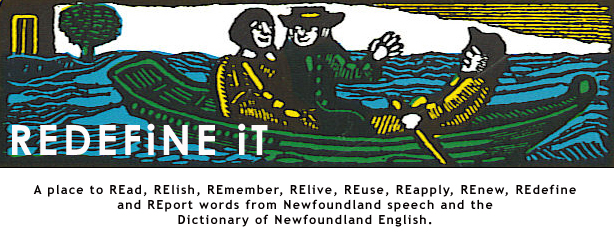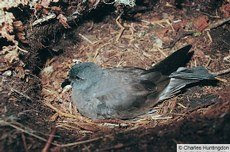Edmund Clarence Stedman, ed. (1833–1908). A Victorian Anthology, 1837–1895. 1895.Ode to
Mother Carey’s ChickenTheodore Watts-Dunton (1832–1914)
On Seeing a Storm-Petrel in a Cage on a Cottage Wall and Releasing It
GAZE not at me, my poor unhappy bird;
That sorrow is more than human in thine eye;
Too deep already is my spirit stirr’d
To see thee here, child of the sea and sky,
Coop’d in a cage with food thou canst not eat,
5Thy “snow-flake” soli’d, and soli’d those conquering feet
That walk’d the billows, while thy “sweet-sweet-sweet”
Proclaim’d the tempest nigh.
Bird whom I welcom’d while the sailors curs’d,
Friend whom I bless’d wherever keels may roam,
10Prince of my childish dreams, whom mermaids nurs’d
In purple of billows—silver of ocean-foam,
Abash’d I stand before the mighty grief
That quells all other: Sorrow’s king and chief:
To ride the wind and hold the sea in fief,
15 Then find a cage for home!
From out thy jail thou seest yon heath and woods,
But canst thou hear the birds or smell the flowers?
Ah, no! those rain-drops twinkling on the buds
Bring only visions of the salt sea-showers.
20“The sea!” the linnets pipe from hedge and heath;
“The sea!” the honeysuckles whisper and breathe;
And tumbling waves, where those wild-roses wreathe,
Murmur from inland bowers.
These winds so soft to others,—how they burn!
25 The mavis sings with gurgle and ripple and plash,
To thee yon swallow seems a wheeling tern.
And when the rain recalls the briny lash
Old Ocean’s kiss thou lovest,—when thy sight
Is mock’d with Ocean’s horses—manes of white,
30The long and shadowy flanks, the shoulders bright—
Bright as the lightning’s flash,—
When all these scents of heather and brier and whin,
All kindly breaths of land-shrub, flower, and vine,
Recall the sea-scents, till thy feather’d skin
35 Tingles in answer to a dream of brine,—
When thou, remembering there thy royal birth,
Dostsee between the bars a world of dearth,
Is there a grief—a grief on all the earth—
So heavy and dark as thine?
40But I can buy thy freedom—I (thank God!),
Who lov’d thee more than albatross or gull,
Lov’d thee when on the waves thy footsteps trod,
Dream’d of thee when, becalm’d, we lay a-hull—
’T is I thy friend who once, a child of six,
45To find where Mother Carey fed her chicks,
Climb’d up the stranded punt, and with two sticks
Tried all in vain to scull,—
Thy friend who ow’d a Paradise of Storm,—
The little dreamer of the cliffs and coves,
50Who knew thy mother, saw her shadowy form
Behind the cloudy bastions where she moves,
And heard her call: “Come! for the welkin thickens,
And tempests mutter and the lightning quickens!”
Then, starting from his dream, would find the chickens
55 Were only blue rock-doves,—
Thy friend who ow’d another Paradise
Of calmer air, a floating isle of fruit,
Where sang the Nereids on a breeze of spice
While Triton, from afar, would sound salute:
60There wast thou winging, though the skies were calm,
For marvellous strains, as of the morning’s shalm,
Were struck by ripples round that isle of palm
Whose shores were “Carey’s lute.”
And now to see thee here, my king, my king,
65 Far-glittering memories mirror’d in those eyes,
As if there shone within each iris-ring
An orbed world—ocean and hills and skies!—
Those black wings ruffled whose triumphant sweep
Conquer’d in sport!—yea, up the glimmering steep
70Of highest billow, down the deepest deep,
Sported with victories!
To see thee here!—a coil of wilted weeds
Beneath those feet that danced on diamond spray,
Rider of sportive Ocean’s reinless steeds—
75 Winner in Mother Carey’s sabbath-fray
When, stung by magic of the witch’s chant,
They rise, each foamy-crested combatant—
They rise and fall and leap and foam and gallop and pant
Till albatross, sea-swallow, and cormorant
80 Would flee like doves away!
And shalt thou ride no more where thou hast ridden,
And feast no more in hyaline halls and caves,
Master of Mother Carey’s secrets hidden,
Master most equal of the wind and waves,
85Who never, save in stress of angriest blast,
Ask’d ship for shelter,—never, till at last
The foam-flakes, hurl’d against the sloping mast,
Slash’d thee like whirling glaives!
Right home to fields no seamew ever kenn’d,
90 Where scarce the great sea-wanderer fares with thee,
I come to take thee—nay, ’t is I, thy friend—
Ah, tremble not—I come to set thee free;
I come to tear this cage from off this wall,
And take thee hence to that fierce festival
95Where billows march and winds are musical,
Hymning the Victor-Sea!
Yea, lift thine eyes, my own can bear them now:
Thou ’rt free! thou ’rt free. Ah, surely a bird can smile!
Dost know me, Petrel? Dost remember how
100 I fed thee in the wake for many a mile,
Whilst thou wouldst pat the waves, then, rising, take
The morsel up and wheel about the wake?
Thou ’rt free, thou ’rt free, but for thine own dear sake
I keep thee caged awhile.
105Away to sea! no matter where the coast:
The road that turns to home turns never wrong:
Where waves run high my bird will not be lost:
His home I know: ’t is where the winds are strong,—
Where, on her throne of billows, rolling hoary
110And green and blue and splash’d with sunny glory,
Far, far from shore—from farthest promontory—
The mighty Mother sings the triumphs of her story,
Sings to my bird the song!
***************
Carey chick or Mother Carey's chicks is our word of the week here at REDEFiNE iT.















